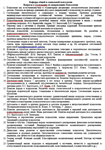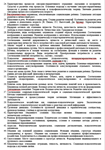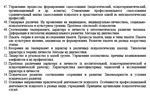Answers to questions on psychology 55 questions
Content: Ответы к госэкзамену по направлению Психология 55 вопросов.doc (1.35 MB)
Uploaded: 01.06.2017
Positive responses: 0
Negative responses: 0
Sold: 3
Refunds: 0
$15
Department of General and Social Psychology
Questions to the state examination in the direction of Psychology
1. Psychology as a natural and humanitarian discipline: methodological assumption and methods. Show by comparing two schools (directions) in psychology (at the student´s choice).
2. The correlation of biological and social in the human psyche. The problem of distinguishing individual-typological features of a person (temperament) and character. Taking into account the individual characteristics of the addressee when solving the tasks of the transforming influence.
3. Psychotechnologies for the formation of various skills: a general view and analysis from the standpoint of different approaches. Bernstein, Anokhin, LS Vygotsky, P.Ya. Halperin.
4. Feedback in learning and communication. Principle of sensory corrections. The use of feedback in the professional work of a psychologist.
5. Methods of psychology: research, examination and transformation. Their differences and complementarity. Correlation of diagnosis and correction.
6. Complex individual psychological examination: principles, norms, conditions, the problem of adequacy of methods.
7. The correlation of theory and scientific hypothesis. Basics of experiment planning: problem, goal, tasks, types of variables, selection of methods for data collection, etc. On the basis of your own final qualifying work.
8. Functions and structure of the diagnostic conclusion (description and theoretical justification). Suggest an example of a successful diagnostic report (give an analysis).
9. "Reflexology" (VM Bekhterev, IP Pavlov) and "behavioral" (J. Watson, E. Tolman, B. Skinner) stages in the history of psychology.
10. Abilities. Theories of abilities. The problem of the formation of abilities: similarity and differences between abilities and skills.
11. Development of concepts of the unconscious. The role of Z. Freud in the development of the problem of the unconscious. "Collective unconscious" and "archetypes" in the work of K.G. Cabin boy. Installation and the unconscious in the psychological school. Uznadze.
12. Diagnostics of abilities: methods, the problem of their validity, trends in the development of methods.
13. The ratio of imagination and creative thinking. Erection and creativity. Studies of creativity. Diagnosis of creativity. Development of creative potential.
14. Activity approach - arguments in its favor and criticism. The theory of sign-instrumental mediation and social conditioning of the human psyche. Methodological significance of the works of LS. Vygotsky, A.R. Luria, A.N. Leontief.
15. The concept of the norm in psychology. The difference between statistical and psychological norms. Criteria of mental norm. Social and biological norms. Correlation of norm and pathology.
16. Stages of ontogenetic development of man: a comparative analysis of the approaches of domestic and foreign authors. Use of the idea of the stage of individual development for the purposes of education and psychotherapy (psychological counseling).
17. Arguments in defense and criticism of the subject and methods of cognition in introspective psychology. Experimental psychology (W. Wundt, E. Titchener, W. James).
18. The concept of activity. Structure of activity. Internal and external plan of activities, mutual transitions between them. Types of activities. The concept of leading activity in the concept of LS. Vygotsky-A.N. Leontief.
19. Problems and prospects for the development of psychology, new directions. Suggest a version of the trends in the development of psychology.
20. Emotions and feelings. Social norms of emotional response, the phenomena of collective emotional states. Individual features of emotional response. The problem of emotional disorders and their correction.
21. The driving forces of development in the presentation of domestic psychologists. Biological, social and spiritual development. Ontogenetic formation of a person as a (s
Questions to the state examination in the direction of Psychology
1. Psychology as a natural and humanitarian discipline: methodological assumption and methods. Show by comparing two schools (directions) in psychology (at the student´s choice).
2. The correlation of biological and social in the human psyche. The problem of distinguishing individual-typological features of a person (temperament) and character. Taking into account the individual characteristics of the addressee when solving the tasks of the transforming influence.
3. Psychotechnologies for the formation of various skills: a general view and analysis from the standpoint of different approaches. Bernstein, Anokhin, LS Vygotsky, P.Ya. Halperin.
4. Feedback in learning and communication. Principle of sensory corrections. The use of feedback in the professional work of a psychologist.
5. Methods of psychology: research, examination and transformation. Their differences and complementarity. Correlation of diagnosis and correction.
6. Complex individual psychological examination: principles, norms, conditions, the problem of adequacy of methods.
7. The correlation of theory and scientific hypothesis. Basics of experiment planning: problem, goal, tasks, types of variables, selection of methods for data collection, etc. On the basis of your own final qualifying work.
8. Functions and structure of the diagnostic conclusion (description and theoretical justification). Suggest an example of a successful diagnostic report (give an analysis).
9. "Reflexology" (VM Bekhterev, IP Pavlov) and "behavioral" (J. Watson, E. Tolman, B. Skinner) stages in the history of psychology.
10. Abilities. Theories of abilities. The problem of the formation of abilities: similarity and differences between abilities and skills.
11. Development of concepts of the unconscious. The role of Z. Freud in the development of the problem of the unconscious. "Collective unconscious" and "archetypes" in the work of K.G. Cabin boy. Installation and the unconscious in the psychological school. Uznadze.
12. Diagnostics of abilities: methods, the problem of their validity, trends in the development of methods.
13. The ratio of imagination and creative thinking. Erection and creativity. Studies of creativity. Diagnosis of creativity. Development of creative potential.
14. Activity approach - arguments in its favor and criticism. The theory of sign-instrumental mediation and social conditioning of the human psyche. Methodological significance of the works of LS. Vygotsky, A.R. Luria, A.N. Leontief.
15. The concept of the norm in psychology. The difference between statistical and psychological norms. Criteria of mental norm. Social and biological norms. Correlation of norm and pathology.
16. Stages of ontogenetic development of man: a comparative analysis of the approaches of domestic and foreign authors. Use of the idea of the stage of individual development for the purposes of education and psychotherapy (psychological counseling).
17. Arguments in defense and criticism of the subject and methods of cognition in introspective psychology. Experimental psychology (W. Wundt, E. Titchener, W. James).
18. The concept of activity. Structure of activity. Internal and external plan of activities, mutual transitions between them. Types of activities. The concept of leading activity in the concept of LS. Vygotsky-A.N. Leontief.
19. Problems and prospects for the development of psychology, new directions. Suggest a version of the trends in the development of psychology.
20. Emotions and feelings. Social norms of emotional response, the phenomena of collective emotional states. Individual features of emotional response. The problem of emotional disorders and their correction.
21. The driving forces of development in the presentation of domestic psychologists. Biological, social and spiritual development. Ontogenetic formation of a person as a (s
24. Characteristics of the processes of sensory-perceptual reflection: sensation and perception. Similarity and difference of these processes. Basic approaches to the study of sensory-perceptual processes in various psychological and psychophysiological theories. The significance of the development of sensory processes in infancy.
25. Intrapersonal mechanisms ensuring the socialization of the child. The social situation of development and personal growth.
26. Thinking and speaking. Functions and types of speech. Stages of development of concepts. Features of speech development in early and preschool years (J. Piaget, LS Vygotsky, J. Bruner). Characteristics of everyday consciousness in adults.
27. Hierarchy of motives as the basis of personality. Act, integrity of personality. The ratio of freedom and responsibility of the individual. Personal strength. Civil position.
28. Imagination, types of imagination, mechanisms for creating images of imagination. The ratio of imagination and thinking. Development of imagination in ontogenesis. The use of imagination in the construction of modern psychotechnical and psychotherapeutic procedures.
29. The correlation of concepts is the direction of the individual and the personal meaning, their place in the characterization of the personality. The place of needs in the semantic regulation of human activities.
30. Analysis of theories and approaches to the problem of attention. Attention in social relations, management of the attention of the group. Place of attention in the professional work of a psychologist.
31. Motives, needs and emotions of a person: their correlation, functions and influence on the development of cognitive processes. Types of needs. Transformation needs into a motive. The ratio of the concepts "need", "motive", "emotions".
32. Psychology of deviant behavior (psychopathology, pathocharacter and psychopathological features of behavior, addictions, etc.).
33. Psychological counseling: the concept, goals, objectives, principles. The main directions in psychological counseling. Features of individual counseling, family and organization.
34. Family as a small group. The role of the family in the personal development and socialization of the child. The problem of early childhood fixations: phenomena and interpretations.
35. The essence of the transforming effect. Object, purpose, objectives and principles. The correlation of concepts: "psychotherapy", "psychological counseling" and "psychological correction".
36. The concept of the will, the phenomenology of volitional acts. The ratio of the concepts of will and arbitrariness. Mechanisms of volitional regulation. Willed personality qualities, possible ways of their formation. Conducting behavior. The theory of will. Willed personality qualities. Development of willpower.
37. Correlation of socio-psychological theory and socio-psychological practice. Methods of social psychology.
38. Substantive and procedural theories of motivation. Motivation and performance.
39. Psychological influence as a social and psychological task. Environmental requirements for psychological impact in the media.
40. Group dynamics. Features of group dynamics in therapeutic communities, industrial, educational and friendly collectives.
41. Characteristics of ordinary consciousness. Mass phenomena. Mechanisms of formation of human communities.
42. Modes of functioning of the psyche. Mental conditions. Modified states of consciousness (psyche). State management, principles, conditions and basic methods of working with negative experiences.
43. Aggression. Phylogenetic prerequisites, social regulation, psychological mechanisms.
44. Communication as the main mechanism of socialization. Communication functions, communication structure (components) and process. Communication as the basic condition and mechanism of professional influence. Competence in communication as a professional qualification of a psychologist.
45. Self-awareness.
25. Intrapersonal mechanisms ensuring the socialization of the child. The social situation of development and personal growth.
26. Thinking and speaking. Functions and types of speech. Stages of development of concepts. Features of speech development in early and preschool years (J. Piaget, LS Vygotsky, J. Bruner). Characteristics of everyday consciousness in adults.
27. Hierarchy of motives as the basis of personality. Act, integrity of personality. The ratio of freedom and responsibility of the individual. Personal strength. Civil position.
28. Imagination, types of imagination, mechanisms for creating images of imagination. The ratio of imagination and thinking. Development of imagination in ontogenesis. The use of imagination in the construction of modern psychotechnical and psychotherapeutic procedures.
29. The correlation of concepts is the direction of the individual and the personal meaning, their place in the characterization of the personality. The place of needs in the semantic regulation of human activities.
30. Analysis of theories and approaches to the problem of attention. Attention in social relations, management of the attention of the group. Place of attention in the professional work of a psychologist.
31. Motives, needs and emotions of a person: their correlation, functions and influence on the development of cognitive processes. Types of needs. Transformation needs into a motive. The ratio of the concepts "need", "motive", "emotions".
32. Psychology of deviant behavior (psychopathology, pathocharacter and psychopathological features of behavior, addictions, etc.).
33. Psychological counseling: the concept, goals, objectives, principles. The main directions in psychological counseling. Features of individual counseling, family and organization.
34. Family as a small group. The role of the family in the personal development and socialization of the child. The problem of early childhood fixations: phenomena and interpretations.
35. The essence of the transforming effect. Object, purpose, objectives and principles. The correlation of concepts: "psychotherapy", "psychological counseling" and "psychological correction".
36. The concept of the will, the phenomenology of volitional acts. The ratio of the concepts of will and arbitrariness. Mechanisms of volitional regulation. Willed personality qualities, possible ways of their formation. Conducting behavior. The theory of will. Willed personality qualities. Development of willpower.
37. Correlation of socio-psychological theory and socio-psychological practice. Methods of social psychology.
38. Substantive and procedural theories of motivation. Motivation and performance.
39. Psychological influence as a social and psychological task. Environmental requirements for psychological impact in the media.
40. Group dynamics. Features of group dynamics in therapeutic communities, industrial, educational and friendly collectives.
41. Characteristics of ordinary consciousness. Mass phenomena. Mechanisms of formation of human communities.
42. Modes of functioning of the psyche. Mental conditions. Modified states of consciousness (psyche). State management, principles, conditions and basic methods of working with negative experiences.
43. Aggression. Phylogenetic prerequisites, social regulation, psychological mechanisms.
44. Communication as the main mechanism of socialization. Communication functions, communication structure (components) and process. Communication as the basic condition and mechanism of professional influence. Competence in communication as a professional qualification of a psychologist.
45. Self-awareness.
No feedback yet


